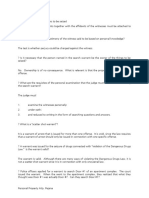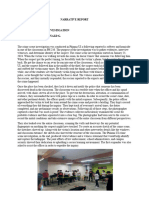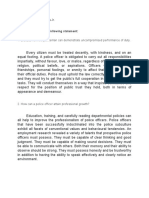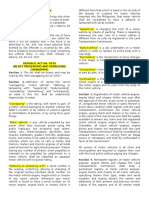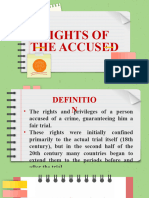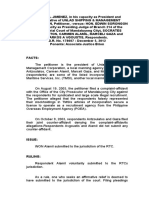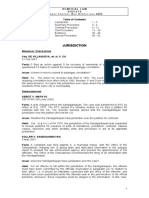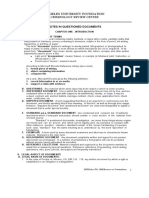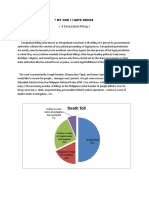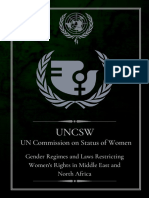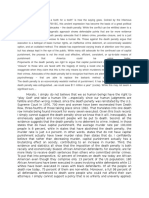100%(1)100% found this document useful (1 vote)
633 viewsRa 7438
Ra 7438
Uploaded by
Earl Andre PerezRA 7438 defines certain rights of persons who are arrested, detained, or under custodial investigation in the Philippines. It also establishes the duties of arresting, detaining, and investigating officers. Specifically, it mandates that (1) arrested or detained persons must be assisted by counsel at all times and be informed of their right to remain silent and have counsel, (2) custodial investigation reports must be read and explained to the person by their counsel before signing, and (3) extrajudicial confessions must be in writing and signed in the presence of counsel or a relative. Violations of these rights and duties can result in penalties.
Copyright:
© All Rights Reserved
Available Formats
Download as PPTX, PDF, TXT or read online from Scribd
Ra 7438
Ra 7438
Uploaded by
Earl Andre Perez100%(1)100% found this document useful (1 vote)
633 views11 pagesRA 7438 defines certain rights of persons who are arrested, detained, or under custodial investigation in the Philippines. It also establishes the duties of arresting, detaining, and investigating officers. Specifically, it mandates that (1) arrested or detained persons must be assisted by counsel at all times and be informed of their right to remain silent and have counsel, (2) custodial investigation reports must be read and explained to the person by their counsel before signing, and (3) extrajudicial confessions must be in writing and signed in the presence of counsel or a relative. Violations of these rights and duties can result in penalties.
Original Title
RA 7438 - Copy
Copyright
© © All Rights Reserved
Available Formats
PPTX, PDF, TXT or read online from Scribd
Share this document
Did you find this document useful?
Is this content inappropriate?
RA 7438 defines certain rights of persons who are arrested, detained, or under custodial investigation in the Philippines. It also establishes the duties of arresting, detaining, and investigating officers. Specifically, it mandates that (1) arrested or detained persons must be assisted by counsel at all times and be informed of their right to remain silent and have counsel, (2) custodial investigation reports must be read and explained to the person by their counsel before signing, and (3) extrajudicial confessions must be in writing and signed in the presence of counsel or a relative. Violations of these rights and duties can result in penalties.
Copyright:
© All Rights Reserved
Available Formats
Download as PPTX, PDF, TXT or read online from Scribd
Download as pptx, pdf, or txt
100%(1)100% found this document useful (1 vote)
633 views11 pagesRa 7438
Ra 7438
Uploaded by
Earl Andre PerezRA 7438 defines certain rights of persons who are arrested, detained, or under custodial investigation in the Philippines. It also establishes the duties of arresting, detaining, and investigating officers. Specifically, it mandates that (1) arrested or detained persons must be assisted by counsel at all times and be informed of their right to remain silent and have counsel, (2) custodial investigation reports must be read and explained to the person by their counsel before signing, and (3) extrajudicial confessions must be in writing and signed in the presence of counsel or a relative. Violations of these rights and duties can result in penalties.
Copyright:
© All Rights Reserved
Available Formats
Download as PPTX, PDF, TXT or read online from Scribd
Download as pptx, pdf, or txt
You are on page 1of 11
RA 7438
AN ACT DEFINING CERTAIN RIGHTS OF
PERSON ARRESTED, DETAINED OR UNDER
CUSTODIAL INVESTIGATION AS WELL AS THE
DUTIES OF THE ARRESTING, DETAINING AND
INVESTIGATING OFFICERS, AND PROVIDING
PENALTIES FOR VIOLATIONS THEREOF
Rights of Persons Arrested, Detained or Under
Custodial Investigation; Duties of Public
Officers
(a) Any person arrested detained or under custodial
investigation shall at all times be assisted by counsel.
(b) Any public officer or employee, or anyone acting under
his order or his place, who arrests, detains or investigates
any person for the commission of an offense shall inform
the latter, in a language known to and understood by him,
of his rights to remain silent and to have competent and
independent counsel, preferably of his own choice, who
shall at all times be allowed to confer privately with the
person arrested, detained or under custodial investigation.
If such person cannot afford the services of his own
counsel, he must be provided with a competent and
independent counsel by the investigating officer
(c) The custodial investigation report shall be
reduced to writing by the investigating officer,
provided that before such report is signed, or
thumbmarked if the person arrested or detained does
not know how to read and write, it shall be read and
adequately explained to him by his counsel or by the
assisting counsel provided by the investigating officer
in the language or dialect known to such arrested or
detained person, otherwise, such investigation report
shall be null and void and of no effect whatsoever.
(d) Any extrajudicial confession made by a person
arrested, detained or under custodial investigation
shall be in writing and signed by such person in the
presence of his counsel or in the latter's absence,
upon a valid waiver, and in the presence of any of the
parents, elder brothers and sisters, his spouse, the
municipal mayor, the municipal judge, district school
supervisor, or priest or minister of the gospel as
chosen by him; otherwise, such extrajudicial
confession shall be inadmissible as evidence in any
proceeding.
(e) Any waiver by a person arrested or detained
under the provisions of Article 125 of the Revised
Penal Code, or under custodial investigation, shall be
in writing and signed by such person in the presence
of his counsel; otherwise the waiver shall be null and
void and of no effect.
(f) Any person arrested or detained or under custodial
investigation shall be allowed visits by or conferences with
any member of his immediate family, or any medical doctor
or priest or religious minister chosen by him or by any
member of his immediate family or by his counsel, or by any
national non-governmental organization duly accredited by
the Commission on Human Rights of by any international
non-governmental organization duly accredited by the
Office of the President. The person's "immediate family"
shall include his or her spouse, fiancé or fiancée, parent or
child, brother or sister, grandparent or grandchild, uncle or
aunt, nephew or niece, and guardian or ward.
As used in this Act, "custodial investigation" shall
include the practice of issuing an "invitation" to a
person who is investigated in connection with an
offense he is suspected to have committed, without
prejudice to the liability of the "inviting" officer for
any violation of law.
In the absence of any lawyer, no custodial
investigation shall be conducted and the suspected
person can only be detained by the investigating
officer in accordance with the provisions of Article
125 of the Revised Penal Code.
THANK YOU!
You might also like
- Civ Pro (Riano) PDFDocument110 pagesCiv Pro (Riano) PDFJude-lo Aranaydo80% (5)
- LOCKED AWAY FOR LIFE Answer SheetDocument4 pagesLOCKED AWAY FOR LIFE Answer SheetBradley WilliamsNo ratings yet
- RA 10883: The New Anti-Carnapping ActDocument2 pagesRA 10883: The New Anti-Carnapping Actangelsu04No ratings yet
- Anti Rape LawDocument15 pagesAnti Rape LawAurora Maramba100% (1)
- Crimes and Penalties (Criminal Law II)Document72 pagesCrimes and Penalties (Criminal Law II)Earl Andre PerezNo ratings yet
- Summary On Corporation Code of The PhilippinesDocument30 pagesSummary On Corporation Code of The PhilippinesEarl Andre Perez100% (1)
- RA 7438 (Custodial Investigation)Document3 pagesRA 7438 (Custodial Investigation)Asiong100% (1)
- Rule 126Document4 pagesRule 126JvnRodz P GmlmNo ratings yet
- 1 - The Revised Penal Code (Book 2)Document12 pages1 - The Revised Penal Code (Book 2)jeysonmacaraigNo ratings yet
- Brigandage Art. 306: Crim Law Ii Reviewer Indira PrabhakerDocument13 pagesBrigandage Art. 306: Crim Law Ii Reviewer Indira Prabhakerknicky FranciscoNo ratings yet
- CDI-1 RecordDocument10 pagesCDI-1 RecordRizza Joy BabasaNo ratings yet
- BJMP Organizational StructureDocument5 pagesBJMP Organizational StructureTaneo Joie100% (3)
- Art 275 RPC, Reyes, Book TwoDocument1 pageArt 275 RPC, Reyes, Book TwoNeil bryan MoninioNo ratings yet
- Narrative ReportDocument1 pageNarrative Reportrechinpedilla100% (1)
- Article 334Document2 pagesArticle 334thebarman79100% (1)
- Case Analysis - Activity 3 - MindeDocument3 pagesCase Analysis - Activity 3 - MindeLainie ZefiahNo ratings yet
- Post Facto Laws. - An Act Which When Committed Was Not A Crime, Cannot Be Made So by Statute WithoutDocument5 pagesPost Facto Laws. - An Act Which When Committed Was Not A Crime, Cannot Be Made So by Statute WithoutJohn PaulNo ratings yet
- Crim Law 1 ReviewDocument11 pagesCrim Law 1 ReviewJohn Mark ParacadNo ratings yet
- Crim 4 - GarillosDocument2 pagesCrim 4 - GarillosJerome Jr. , Fermilan GarillosNo ratings yet
- BJMP Comprehensive Operations Manual 2015 EditionDocument3 pagesBJMP Comprehensive Operations Manual 2015 EditionLowell De Los ReyesNo ratings yet
- Poli Case DigestsDocument84 pagesPoli Case DigestsMarilen RoqueNo ratings yet
- Ant-Fencing Q&ADocument42 pagesAnt-Fencing Q&AStephanie Reyes GoNo ratings yet
- PNP Manual in Handling Cases of Children at Risk and Children in Conflict With The LawDocument5 pagesPNP Manual in Handling Cases of Children at Risk and Children in Conflict With The LawAmy Tabingo100% (1)
- Title Viii: Chapter Iii: (R.A. 8353) Arts. 266-A - 266-D of The Revised Penal CodeDocument28 pagesTitle Viii: Chapter Iii: (R.A. 8353) Arts. 266-A - 266-D of The Revised Penal CodeHyman Jay BlancoNo ratings yet
- Police Intelligence and Secret Service: Elicitation Portrait ParleDocument11 pagesPolice Intelligence and Secret Service: Elicitation Portrait ParleKiven M. GeonzonNo ratings yet
- People Vs AdornoDocument18 pagesPeople Vs AdornoAswigue LloydNo ratings yet
- RPC Article 173Document7 pagesRPC Article 173ermeline tampusNo ratings yet
- Final Module CP221Document32 pagesFinal Module CP221LEA CORPUZNo ratings yet
- Comparative Police System JordanDocument4 pagesComparative Police System JordanJ Navarro100% (1)
- Crim 2 Module 2 Atty A.D.G.Document7 pagesCrim 2 Module 2 Atty A.D.G.Badens DgNo ratings yet
- LEA 4 - Module 9Document14 pagesLEA 4 - Module 9Anthony EhaponNo ratings yet
- CLJ 2 Human Rights Education Midterm ExaminationDocument3 pagesCLJ 2 Human Rights Education Midterm ExaminationArmando Pantaleon100% (1)
- Inquest and Preliminary InvestigationDocument13 pagesInquest and Preliminary InvestigationCarlo Louise D. Manoles100% (3)
- Non-Institutional Based Correction Programs: AmnestyDocument5 pagesNon-Institutional Based Correction Programs: AmnestyAcquisha Yestin SionaNo ratings yet
- Welfare and Development Section (WDS)Document6 pagesWelfare and Development Section (WDS)Darwin Patricio100% (1)
- Criminal Procedure and Court Testimony: Study Guide No. 6Document6 pagesCriminal Procedure and Court Testimony: Study Guide No. 6Kasumi AlbaNo ratings yet
- Republic Act 8353Document27 pagesRepublic Act 8353Rovi ClaritoNo ratings yet
- BDocument15 pagesBMonaliza LiztsNo ratings yet
- ARTICLE 14. Aggravating Circumstances. - : Chapter Four Circumstances Which Aggravate Criminal LiabilityDocument1 pageARTICLE 14. Aggravating Circumstances. - : Chapter Four Circumstances Which Aggravate Criminal LiabilityJerry CaneNo ratings yet
- The Anti-Cattle Rustling Law of 1974Document10 pagesThe Anti-Cattle Rustling Law of 1974Aices SalvadorNo ratings yet
- 3 - Reception ProcedureDocument11 pages3 - Reception ProcedureJAMES MARDIE GADNo ratings yet
- Document and Information Security IISMCDocument13 pagesDocument and Information Security IISMCJoshua BabalconNo ratings yet
- Lesson 5: Spot/Check/ Accosting and ProceduresDocument46 pagesLesson 5: Spot/Check/ Accosting and ProceduresPaolo MercadoNo ratings yet
- Forensic 5 Module 2Document11 pagesForensic 5 Module 2Jane Casanillo 3204No ratings yet
- History of Correction-INSTITUTIONAL CORRECTIONSDocument5 pagesHistory of Correction-INSTITUTIONAL CORRECTIONSE.D.A.No ratings yet
- 2nd-Set CRIM Case-Digest 24-25 20190208Document2 pages2nd-Set CRIM Case-Digest 24-25 20190208Hemsley Battikin Gup-ay0% (1)
- (G.R. Nos. 116196-97. June 23, 1999.) People of The Philippines, Plaintiff-Appellee, V. Pablo ADOVISO, Defendant-AppellantDocument17 pages(G.R. Nos. 116196-97. June 23, 1999.) People of The Philippines, Plaintiff-Appellee, V. Pablo ADOVISO, Defendant-AppellantJan Gatchalian ReolaNo ratings yet
- Correctional Administration: (Institutional Correction)Document15 pagesCorrectional Administration: (Institutional Correction)RamirezNo ratings yet
- CA 1.2 Institutional CorrectionDocument14 pagesCA 1.2 Institutional CorrectionMiguel AdonesNo ratings yet
- Article 257. Unintentional Abortion ElementsDocument3 pagesArticle 257. Unintentional Abortion ElementsJason ToddNo ratings yet
- Anti Rape LawDocument32 pagesAnti Rape LawAngel UrbanoNo ratings yet
- Anti-Fencing Law OF 1979 (PD NO. 1612) : ElementsDocument18 pagesAnti-Fencing Law OF 1979 (PD NO. 1612) : ElementsJuvy100% (1)
- Ethics and Police Community RelationDocument14 pagesEthics and Police Community RelationJvnRodz P GmlmNo ratings yet
- Lea 3 Industrial Security ConceptDocument40 pagesLea 3 Industrial Security ConceptCastillo Marjolyn FloresNo ratings yet
- CRIMINAL LAW 2 (Title 8)Document15 pagesCRIMINAL LAW 2 (Title 8)Angelica SantelicesNo ratings yet
- Attrition SystemDocument7 pagesAttrition SystemPio Ncrpo100% (1)
- 067 People v. DalawisDocument2 pages067 People v. DalawisRS SuyosaNo ratings yet
- CLJ 1 - Module 4Document8 pagesCLJ 1 - Module 4Sy Benitez EnriquezNo ratings yet
- LEA 2 Competency 4Document16 pagesLEA 2 Competency 4Kristel AnnNo ratings yet
- RPC Art 134-172Document23 pagesRPC Art 134-172Marielle Joie PinedaNo ratings yet
- Law Enforcement Code of EthicsDocument1 pageLaw Enforcement Code of EthicsRosemarie FranciscoNo ratings yet
- Ra 7438 ReviewerDocument1 pageRa 7438 ReviewerDawn JessaNo ratings yet
- Rights of The Accused G8Document12 pagesRights of The Accused G8felectric44No ratings yet
- Rights of Person A, D, Under CIDocument1 pageRights of Person A, D, Under CIclaireNo ratings yet
- Paquito V. Ando vs. Andresito Y. Campo Et. Al. G.R. No. 184007, February 16, 2011 PONTENTE: J. NachuraDocument2 pagesPaquito V. Ando vs. Andresito Y. Campo Et. Al. G.R. No. 184007, February 16, 2011 PONTENTE: J. NachuraEarl Andre PerezNo ratings yet
- G.R. No. 210987Document2 pagesG.R. No. 210987Earl Andre PerezNo ratings yet
- Hector Treas, Petitioner, - Versus - People of The Philippines, Respondent. G. R. No. 195002 January 25, 2012 Ponente: Sereno, J.Document3 pagesHector Treas, Petitioner, - Versus - People of The Philippines, Respondent. G. R. No. 195002 January 25, 2012 Ponente: Sereno, J.Earl Andre PerezNo ratings yet
- G.R. No. 178607Document2 pagesG.R. No. 178607Earl Andre PerezNo ratings yet
- G.R. No. 208232Document2 pagesG.R. No. 208232Earl Andre PerezNo ratings yet
- Jurisdiction: Remedial Law Digests A C B O 2 0 0 2Document42 pagesJurisdiction: Remedial Law Digests A C B O 2 0 0 2Earl Andre PerezNo ratings yet
- Reviewer in QDDocument56 pagesReviewer in QDEarl Andre PerezNo ratings yet
- Review On TrafficDocument9 pagesReview On TrafficEarl Andre PerezNo ratings yet
- Commercial Law Review: Maria Zarah Villanueva - CastroDocument31 pagesCommercial Law Review: Maria Zarah Villanueva - CastroEarl Andre PerezNo ratings yet
- Destruction of LifeDocument3 pagesDestruction of LifeEarl Andre PerezNo ratings yet
- Execution and Satisfaction of Judgments (10 Cases)Document11 pagesExecution and Satisfaction of Judgments (10 Cases)Earl Andre PerezNo ratings yet
- Chanrobles Virtual Law LibraryDocument3 pagesChanrobles Virtual Law LibraryEarl Andre Perez100% (1)
- Crimes Committed by Public Officers: Article 203Document22 pagesCrimes Committed by Public Officers: Article 203Earl Andre Perez100% (1)
- Angeles University Forundation: Criminology Review CenterDocument200 pagesAngeles University Forundation: Criminology Review CenterEarl Andre PerezNo ratings yet
- Estafa and Other DeceitsDocument4 pagesEstafa and Other DeceitsEarl Andre PerezNo ratings yet
- Case #53 Vivian Villanueva Vs Atty Cornelius Gonzales A. C. No. 7657, February 12, 2008 Carpio, JDocument6 pagesCase #53 Vivian Villanueva Vs Atty Cornelius Gonzales A. C. No. 7657, February 12, 2008 Carpio, JEarl Andre PerezNo ratings yet
- Criminal Law 2 Lecture Notes Part IIDocument83 pagesCriminal Law 2 Lecture Notes Part IIEarl Andre PerezNo ratings yet
- Death Toll: " My God ! I Hate DrugsDocument3 pagesDeath Toll: " My God ! I Hate DrugsSheryl SegundoNo ratings yet
- New Visa Application Form For Kingdom of Saudi ArabiaDocument1 pageNew Visa Application Form For Kingdom of Saudi ArabiasuhasNo ratings yet
- (Reviewed) LGBTQ+ AnecdoteDocument5 pages(Reviewed) LGBTQ+ Anecdotevarunendra pandeyNo ratings yet
- Education System of Pakistan - Issues, Problems and Solutions - IPRI - Islamabad Policy Research InstituteDocument10 pagesEducation System of Pakistan - Issues, Problems and Solutions - IPRI - Islamabad Policy Research InstituteMyname 16thNo ratings yet
- Tennessee Black Caucus Criminal Justice Reform LegislationDocument10 pagesTennessee Black Caucus Criminal Justice Reform LegislationTNSenateDemsNo ratings yet
- UNSCW. United Nations Status On The Commission of WomenDocument19 pagesUNSCW. United Nations Status On The Commission of WomenAbdul RehmanNo ratings yet
- Ewoton Maurine Imuron AbstractDocument1 pageEwoton Maurine Imuron AbstractRaytone Tonnie MainaNo ratings yet
- The Graduation ApproachDocument2 pagesThe Graduation ApproachGlaiza Veluz-SulitNo ratings yet
- Solitary Confinement EssayDocument3 pagesSolitary Confinement Essayapi-310709607No ratings yet
- Name - Bai Allay-WPS OfficeDocument2 pagesName - Bai Allay-WPS OfficeDatuesmail Ala AliNo ratings yet
- Bandura's TheoryDocument7 pagesBandura's Theorycaren santosNo ratings yet
- Reviewer Human Rights - PetralbaDocument9 pagesReviewer Human Rights - Petralbajef comendador100% (2)
- The Anti-Terrorism Act of 2020 Oral ArgumentsDocument4 pagesThe Anti-Terrorism Act of 2020 Oral ArgumentsMizu LilyNo ratings yet
- Multi Essay TopicsDocument3 pagesMulti Essay TopicsZeshan TahirNo ratings yet
- LegalAid and Legal AwarenessDocument16 pagesLegalAid and Legal AwarenessShubham TripathiNo ratings yet
- Barangay Resolution 001 - 122453Document2 pagesBarangay Resolution 001 - 122453Norven B. GrantosNo ratings yet
- Your Voice Matters - Flyer Handouts - 6 July 2020Document5 pagesYour Voice Matters - Flyer Handouts - 6 July 2020Breitbart News50% (4)
- Impact of Mid-Day Meal Programme in Developing Health Index and Social Values Among School StudentsDocument3 pagesImpact of Mid-Day Meal Programme in Developing Health Index and Social Values Among School StudentsSNEHA100% (1)
- An Eye For An EyeDocument2 pagesAn Eye For An EyeMaxine TaeyeonNo ratings yet
- Hell in ParadiseDocument5 pagesHell in ParadiseThavamNo ratings yet
- Legal Lang Sem2 AssignmentDocument7 pagesLegal Lang Sem2 AssignmentHelik SoniNo ratings yet
- Gender Justice Pyq (Ajit)Document26 pagesGender Justice Pyq (Ajit)Fake IDNo ratings yet
- B2 The Civil Rights Movement LIU024: "I Have A DreamDocument2 pagesB2 The Civil Rights Movement LIU024: "I Have A DreamАнна МусороваNo ratings yet
- Protecting Women's Rights A Case Study in The PHDocument7 pagesProtecting Women's Rights A Case Study in The PHJose Ignatius D. PerezNo ratings yet
- Gov't Programs and Initiative in Addresing Social InequalitiesDocument70 pagesGov't Programs and Initiative in Addresing Social InequalitiesCLARIZZE JAINE MANALO100% (3)
- Suicide Risk Assessment Form Erbacher 2015Document6 pagesSuicide Risk Assessment Form Erbacher 2015Marcela c. BuenvenidaNo ratings yet
- 2019 FNS 313 SNAP English For 508Document2 pages2019 FNS 313 SNAP English For 508gineth976No ratings yet
- No Vote On Jail - A Position PaperDocument3 pagesNo Vote On Jail - A Position PaperAlden MiradorNo ratings yet
- Mil W3Document6 pagesMil W3Annie LouNo ratings yet







